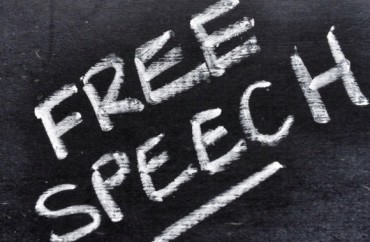
Recent Harvard Law School graduate Kendra Albert (who uses the pronoun “they”) says the average person who flippantly uses legal words outside of the legal realm “lose[s] sight of the often discriminatory history” of such terminology.
The Harvard Crimson reports that Albert dubs such terms “legal talismans” — a “legal term of art, out of place, invoked to make or justify substantive decisions that do not involve formal legal processes.”
Common legal talismans, “they” say, are “free speech” and “defamation,” the latter of which “hides deeply sexist, racist, and whorephobic, which means ‘anti-sex worker,’ connotations.”
When people “casually reference” such terminology, they’re ignoring the lingo’s “prejudicial histories,” Albert notes.
Anne Bellon, a visiting PhD student, praised Albert’s efforts to expose biases that are associated with commonly cited legal principles.
“I really liked when [Albert] started to unpack all these cultural meanings behind the terms ‘defamation’ or even ‘free speech,’ that there was a sexist bias, a racist bias behind those legal terms that you use constantly,” Bellon said.
Ron Newman, another member of the audience, liked Albert’s explanation of the history of defamation and free speech law.
MORE: Fear the Future part 2: critical race theory and free speech limits based on feelings
“[The presentation] peeled back the history behind terms that we use everyday without really thinking about what they mean and where they came from,” he said. …
“The law is not some neutral force that we can reach out to and we can pull into our terms of service or our online spaces without bringing with it its long, long history of oppressing the oppressed,” Albert said.
“The power of the words is what makes them dangerous,” they said. “The fact that [these terms] feel neutral is what means that we should give them a second look.”
Wait a second — the term “free speech” is … dangerous? And … how should we give it a “second look”?
I bet I know.
Consider what Ms. Bellon said — that “free speech” used to have a sexist or racist bias behind it. This is straight from the critical race theory playbook:
“Too often, we are guided by our attachments to certain ideas such as ‘free speech’ to the extent of seriously neglecting the experiences of the oppressed.”
Free speech can
easily be a way, consciously or subconsciously, of imposing the will of the powerful upon the oppressed. The fight against anti-Black sentiments must begin with, and remain centered on Black people and their experiences, desires and political vision. An attempt by white people to ignore the work and will of Black people and set the terms for the fight against racism is still an attempt to keep structural power in white hands. Essentially, it is just a rebranding of racism.
Indeed. Keep in mind that the Seventh Circuit Court of Appeals’ Judge Richard Posner once called critical race theorists “the lunatic core of radical legal egalitarianism.”
MORE: Student attacked by peers upset at his ‘racist white cis male’ free speech campaign
Like The College Fix on Facebook / Follow us on Twitter
IMAGE: Shutterstock
Like The College Fix on Facebook / Follow us on Twitter






Please join the conversation about our stories on Facebook, Twitter, Instagram, Reddit, MeWe, Rumble, Gab, Minds and Gettr.